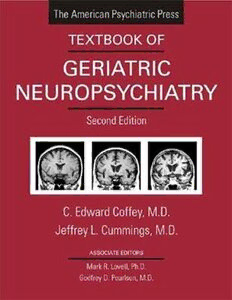
The American Psychiatric Press Textbook of Geriatric Neuropsychiatry, 2nd Edition PDF
1019 Pages·2000·33.613 MB·English
Most books are stored in the elastic cloud where traffic is expensive. For this reason, we have a limit on daily download.
Preview The American Psychiatric Press Textbook of Geriatric Neuropsychiatry, 2nd Edition
Description:
For most of human history, life expectancy was remarkably stable at about 30A40 years. Within the past 150 years, however, medical advances have virtually doubled that number. The worldAs elderly population is growing at 2.4% per year, faster than the rest of the population, with disproportionate increases expected to continue as newer and better treatments are found that minimize the disabilities associated with advanced age. Key to improving the health and quality of life of the elderly is understanding and treating the brain diseases and behavioral disorders that become highly prevalent with age. Geriatric neuropsychiatry is an integrative specialty that draws from many diverse fields, including psychiatry, neurology, neuroscience, and geriatrics. It provides expertise on how to distinguish normal age-related changes from those of disease and disordered brain function. Edited by two eminent practitioners and educators, this wide-ranging textbookAs 41 chapters are divided into five major sections: -Introduction to Geriatric NeuropsychiatryAIntroduces the field, including the epidemiology of aging and its array of interacting and accumulating disadvantages, the neurobiology of aging, and the neurobiological basis of behavior -Neuropsychiatric Assessment of the ElderlyADescribes how to ensure early, accurate diagnoses, using both the fundamental cognitive skills evaluation and the more in-depth neuropsychological evaluation; age-associated memory impairment (AAMI) and its biological bases; anatomic imaging of age-related changes in brain morphology; and the latest imaging techniques that allow visualization of brain function in vivo -Neuropsychiatric Aspects of Psychiatric Disorders in the ElderlyACovers everything from affective and anxiety disorders, substance abuse, and psychoses that start late in life to sleep disorders, delirium, pain, contemporary personality psychology, mental retardation, and aggression -Neuropsychiatric Aspects of Neurological Disease in the ElderlyAFocuses on diseases such as nondegenerative dementing disorders, AlzheimerAs and ParkinsonAs diseases, hyperkinetic movement disorders, stroke, epilepsy, and traumatic brain injury, concluding with medical illnesses and therapies -Principles of Neuropsychiatric Treatment of the ElderlyADiscusses the effect of age in geriatric neuropsychopharmacology, psychopharmacology, ECT, psychosocial therapies, neuropsychiatry in nursing homes, genetic interventions, rehabilitation, ethical issues, and competency and related forensic issues Exhaustively researched and annotated, the American Psychiatric Press Textbook of Geriatric Neuropsychiatry, Second Edition provides a definitive core reference for psychiatry and neurology residents, particularly those pursuing a specialty in geriatrics, and for graduate students in psychology, neuropsychology, and related fields.
See more
The list of books you might like
Most books are stored in the elastic cloud where traffic is expensive. For this reason, we have a limit on daily download.
